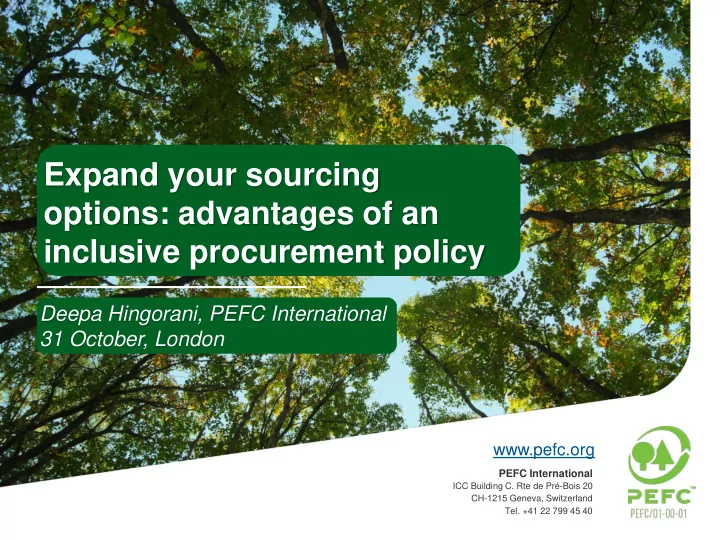

Expand your sourcing options: advantages of an inclusive procurement policy Deepa Hingorani, PEFC International 31 October, London www.pefc.org PEFC International ICC Building C. Rte de Pré-Bois 20 CH-1215 Geneva, Switzerland Tel. +41 22 799 45 40
Global availability of certified materials Only 11% of the world’s forests are certified Certified 11% We need to work together to ensure that more forests are managed sustainably Non- certified 89% 60% hectares Million
Advantages of Inclusive Procurement Policies Developing inclusive policies allowing both systems you can benefit from: • Access to the largest scale of certified material globally • Increased flexibility and risk management in supply chain • Major fibre suppliers are already PEFC-certified and wider benefits include: • Support the growth certified sustainably managed forest area beyond 11% • Decrease the pressure for double-certification and associated costs for forest owners and especially small-holders 3
Inclusive Procurement Policies Timber, Paper, Packaging • PEFC is recognised by the Belgian, British, Danish, Dutch, Finnish, French, German, Japanese, and Swiss Timber Procurement Policies… • Recommended by the European Commission Guidelines on Green Public Procurement • EU Ecolabel • European Retail Environmental Sustainability Code
Inclusive Procurement Policies EU Ecolabel EU Ecolabel recognizes PEFC certification based on the criteria for wood-fibre sustainability sourcing. EU Ecolabel for Paper products , Criterion 3: Fibres – conserving resources, sustainable forest management: • Virgin fibres shall be covered by valid sustainable forest management and chain of custody certificates issued by an independent third party certification scheme such as FSC, PEFC or equivalent. • FSC certified sustainable virgin materials and PEFC certified sustainable virgin materials are considered as equivalent to each other in terms of complying with the 70% minimum. Consequently, the presence of an FSC or PEFC label on the product can be considered as automatic compliance with criterion 3 . EU Ecolabel for Textile Products , Criterion 9 for Man-made cellulose fibres: • A minimum 25 % of pulp fibres shall be manufactured from wood that has been grown according to the principles of sustainable forestry management as defined by the UN FAO. The remaining proportion of pulp fibres shall be from pulp that is sourced from legal forestry and plantations. • Required documentation for Assessment and verification: The applicant shall obtain from the fibre manufacturer(s) valid, independently certified chain of custody certificates demonstrating that the wood fibres have been grown according to sustainable forestry management principles – PEFC or equivalent schemes shall be accepted as independent certification. Sources : EU Ecolabel for Textile Products http://ec.europa.eu/environment/ecolabel/documents/User_manual_textile.pdf EU Ecolabel for Paper products http://ec.europa.eu/environment/ecolabel/documents/tissue_paper_tr_2019.pdf
Inclusive Procurement Policies Construction Green Labels • Green Building Councils (incl. Australia, Italy, and Singapore), LEED (US), the Code for Sustainable Homes, BREEAM (Netherlands, UK), and SKA rating in the UK • Green Building Assessment Protocol for Commercial Buildings, National Green Building Standard, International Green Construction Code (US) and Built Green (Canada) • Comprehensive Assessment System for Built Environmental Efficiency (CASBEE) Japan, Singapore Environment Council
Inclusive Procurement Finance sector Banking Environment Initiative “Soft Commodities Compact” guidelines include PEFC certification for timber products as the internationally recognized means of verification that the CGF is prioritizing for Compact banks’ customer operations. Compact signatories include: Barclays, BNY Mellon, China Construction Bank, Deutsche Bank, Lloyds Banking Group, Nomura, Northern Trust, Santander, Sumitomo Mitsui Banking Corporation and Westpac.
Inclusive procurement in action www.pefc.org
Inclusive Procurement in action Extract from Procurement policy: Extract from Progress policy:
Inclusive Procurement in action Extract from Procurement policy: Extract from Sustainability report:
Inclusive Procurement in action Extract from Procurement policy: Extract from Procurement policy:
Inclusive Procurement in action Extract from Procurement policy: Extract from Procurement policy:
Inclusive Procurement in action Extract from Procurement policy: Extract from Procurement policy:
Inclusive Procurement in action Promotional materials & magazines
Inclusive Procurement in action Bags & tags
Inclusive Procurement in action Store Fitout
Inclusive Procurement Telling the story of sustainable wood fibres in your textiles 17
PEFC can help you to meet your sustainability targets at different levels Sustainable paper Sustainable packaging (promotional materials, posters, catalogues, etc.) 1. Ask your current packaging suppliers for certified paper bags, 1. Ask your current printers & tags, boxes suppliers for certified paper 2. Find more certified suppliers at 2. Find more certified printers at PEFC PEFC database database 3. Encourage your current suppliers to 3. Encourage your current printers to obtain certification obtain certification Sustainable wood- Sustainable stores based textiles (panels, flooring, furniture, hangers etc.) 1. Create & communicate inclusive procurement policy 1. Source certified fittings 2. Ask your fibre supplier for certified fibres 2. Find more suppliers at PEFC 3. Ask your textile suppliers to procure database certified fibres 3. Use PEFC-certified timber to 4. Move towards increasing share of obtain credits for Green certified in your cellulosic textiles value certification for your stores chain (LEED, BREEM, etc.) 5. Move towards full traceability from the forest to the final product
PEFC: Caring for forests together Stage 1: Create inclusive procurement policies : a) Paper and packaging b) Timber (store fittings) c) Wood-based fibres (viscose, lyocel & modal) Stage 2: Communicate it to your suppliers & on your website Stage 3: Start practicing responsible sourcing Stage 4: Encourage your suppliers to increase the share of certified materials in your value chains Stage 5: Aim towards full traceability of wood materials to the sustainable source 19
Caring for forests together Deepa.Hingorani@pefc.org www.pefc.org
Recommend
More recommend